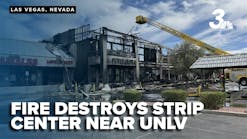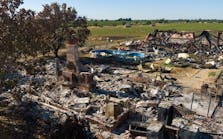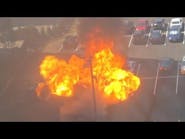While the responses disagree about how firefighters should react to the issue, they do agree that there has been a shortage of equipment. Employer Wackenhut Services, Inc. acknowledged that they have faced numerous challenges to shipping and disbursing gear in Iraq, and told Firehouse.com that the company has been working to improve the situation.
The disagreement among firefighters is about what attitude to take. Some say the situation needs to be addressed for the sake of safety, and out of honesty to other firefighters considering the job. Others say they embrace the challenges and find honor in doing what it takes to support the U.S. military in a war zone.
The former contract firefighters who came forward to voice their concern about equipment in Iraq were former federal firefighter Shane Shifflett of White Sands, New Mexico and firefighter Bryan Milis of Montana Vista Fire Rescue in El Paso County, Texas. Both firefighters worry about possible long term health effects from exposure to hazardous materials. Now, they have been both congratulated and criticized for publicizing their concerns.
One rebuttal came from Firehouse.com contributor and Iraq security contractor August Vernon.
"I just have to say that whoever these guys were they need to get a grip," Vernon wrote. "No one in Iraq has all the equipment and gear they need. I have a job where we go out into the city every day and have crappy equipment. We use light skinned vehicles with no doors. I have been hit with IEDs and small arms fire. Our radios hardly ever work, our vehicles are broken down, etc. I just think that those guys need to understand where they are. The military and contractors over there operate with very limited materials. That is one reason it is a war zone.
Vernon continued, "As firefighters you make do with what you've got. Having no PPE or SCBA means everything is defensive in nature. You adapt and overcome. The small camp I lived in, which was hit daily with mortars and such, had a small volunteer fire brigade that had no equipment except two old Iraqi fire trucks. We had several fires and mass casualty events where everyone did the best they could. Medics run out of supplies all the time.
"That is why firefighter contractors are paid so well. The average salary starts around 80 or 90 thousand or more a year. You get paid to deal with hazardous and difficult situations."
Another rebuttal came in an email from Troy Lee Colvin of Fallujah Fire and Rescue. His full letter is available online in the Firehouse.com forums.
"Here in Iraq a firefighter has got to adapt, overcome, and improvise. It is part of what being a firefighter is all about. All good firefighters know this," he wrote. "As for the way equipment is disbursed, yes there are a few problems. But what do you expect when you drop 276 firefighters into a third world country?
"I think with what little resources there are a lot of the firefighters have done an excellent job in getting their tents, lsa's, and stations into some kind of working order," Colvin wrote. "Unfortunately, you do get disorganization. This is a growing experience and growth does hurt. From the chief all the way down to the newest firefighter. Everyone gets affected.
"Yes there are a few problems with getting PPE to bases. Nothing is perfect but there is still plenty a firefighter can do even if there is no PPE. Once again we adapt, overcome, and improvise. How many times in America has a firehouse had a problem with PPE? Numerous, and you don't hear about it because it is not a high profile place."
Colvin continued, "Approach this with an open mind and see it for what it is. An opportunity to be involved in something that has never been accomplished or even one before. All of us here in Iraq are one big team driving hard for the win."
Another response came from Charles Coomes operating at Camp Taji, Iraq. He agrees that there were equipment shortages at his camp initially but says it is now under control.
"I was in the first group after the initial pre-planning party came in April 2004. I came aboard May 28th and we have come a long, long way," he wrote. "I am at Camp Taji and we are providing the soldiers here with the fire protection they deserve.
"All personnel here at Taji that are working the floor have gear and proper PPE," he wrote. "It wasn't always like that. In the beginning (Aug 1 we started working side by side with the Army firefighters) we were given the option of sharing gear and as a team we decided to share our gear. No one at headquarters asked. We volunteered because we wanted to make a difference, to help our fellow man. That's what firefighters do. I would never, ever enter a structure without proper or proper fitting PPE!
"Contract firefighting is not for everyone and doing a start-up is 10 times harder than just going in and going to work everyday. It is hard work and can be very stressful and at the end of the day you are completely exhausted.
"So if you can handle the hard work and want to join a group of hard working team players (I work with 35 of the best firefighters (Team Taji) in the world who don't whine or complain and have a "Get er done" attitude) come to Iraq, and in a year, if you like it stay for another, if not, you have been there, done that! Is it worth the money? Every Penny! Especially after another "thank you" from our soldiers."
Another firefighter at Camp Taji said gear is still an issue.
"I am stationed at Camp Taji, just northwest of Baghdad," wrote firefighter William G. Harasti. "It is true that much of the equipment is still not on site. From my perspective WSI didn't give much thought to this operation when they started. Many of the guys did get gear, but is not fitting, and no replacements can be had.
"The conditions here are not bad, if you have military background. Many of the firefighters we are getting in have never been out the United States before, and they come to Iraq during a war. Yes, they are way over their heads. From a company standpoint, we don't get much support from Corp. We can't even get a letter from Corp. to cash checks. Pretty bad when your own company won't help its employees to get cash. Just wanted you to know this job here is not for everyone. Conditions are the pits, and won't improve until well after November 2005 or later."
Other firefighters are not satisfied with the promise that WSI is doing everything they can to outfit the firefighters in a timely manner.
One firefighter, who chose not to reveal his name for fear of termination from his post, said he arrived in Baghdad to work in the Green Zone in July 2003 as a KBR/Halliburton employee, before the company subcontracted the operation to WSI.
He wrote, "The story of the two Wackenhut firefighters is very much true. I thought this practice of responding firemen to emergencies with 'little or no gear' was discontinued because of the lessons learned from the Green Zone almost a year before.
"For the firemen in the Green Zone, the situation was a lot worse. Not only did we respond to emergencies inside the Green Zone, but were frequently called to respond to bombings outside the Green Zone with little and/or no PPE. PPE did not arrive until Jan of 2004.
"Due to the fact that I still work for KBR, I fear that if I release my story and or pictures, I will be terminated from my current post."
Another reader says she has been in touch with firefighters at Camp LSA Diamond Back via e-mail.
"I know for a fact that those firefighters have gone without proper gear and equipment since they have been there in July, because I myself have spent my own money to buy and mail things to them. I am glad that Shane and Bryan finally stepped forward, as the others haven't for fear of being fired or suffering repercussions if they complain about the company and the conditions to anyone," she wrote.
"It greatly saddens me to know that the rest of the firefighters there are just trying to finish their contract so they can get paid. No money in the world is worth what these guys have endured... I know that there are other firefighters there who are suffering from the warehouse exposure as well as other exposures, and this company should have more than a formal investigation done on them."
She said she stopped hearing from them after the article appeared on Firehouse.com about the shortage of gear.
Another firefighter, a 13-year volunteer from Iowa seeking a career position, wrote to Firehouse.com, "I had put my application in to Wackenhut to go to Iraq. They called me a week after your story came up from the two returning firefighters complaining about the gear. A manager from Wackenhut had told me every firefighter would have his own fitted turn out gear. I turned down the offer -- money isn't everything. If we are to help out our soldiers we should have the equipment to do so. We can't help that our government sent our troops over there with only half of what they need."
In an update to that article, Shifflett reported to Firehouse.com that he has been prescribed antibiotics for his chronic cough and an inhaler for his breathing, and has attained a lawyer.
From this variety of opinions on the contract firefighting situation in Iraq, it appears that conditions and experiences there vary widely. The question for anyone considering the job is whether these challenges equal grave risk, or great opportunity. According to these responses, it may be both.
Related:





